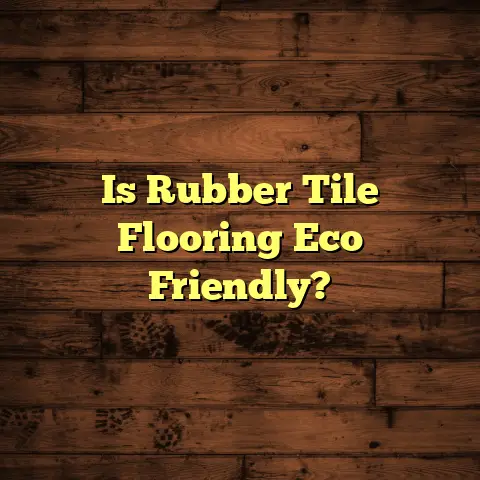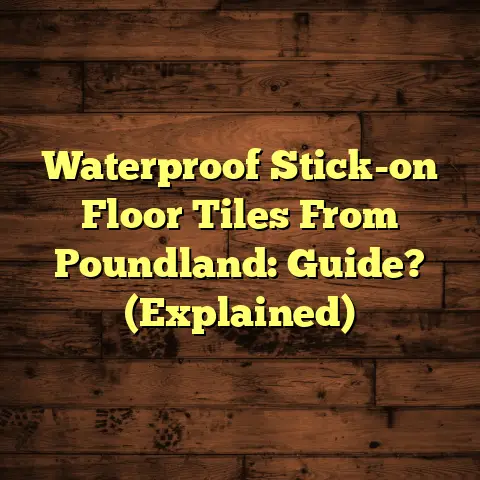Vinyl Sheet Flooring: Durable? (7-Year Lifespan?)
Ever walked into a room with brand-new flooring and thought, “Wow, this looks great!”?
Then, a year or two later, you’re staring at a scratch or a tear, wondering where it all went wrong?
I’ve seen it happen countless times.
Homeowners invest in what they believe is a durable flooring option, like vinyl sheet, only to be disappointed by its short lifespan.
Today, we’re diving deep into the world of vinyl sheet flooring to answer a crucial question: Is it really durable, and can you actually expect it to last for seven years?
Let’s get started!
Understanding Vinyl Sheet Flooring
So, what is vinyl sheet flooring anyway?
Simply put, it’s a continuous, water-resistant flooring option made from several layers of synthetic materials.
Think of it like a layered cake, each layer playing a specific role:
-
Wear Layer: This is the top layer, the one that takes all the abuse. It’s a transparent coating designed to resist scratches, stains, and scuffs. The thicker the wear layer, the more durable the flooring.
-
Design Layer: This is where the magic happens! It’s a printed layer that gives the flooring its appearance – whether it’s a wood grain, stone pattern, or a funky abstract design.
-
Backing Layer: This is the foundation, providing cushioning, stability, and sometimes even sound insulation.
How It’s Made
The manufacturing process is pretty interesting. It typically involves layering these materials together and then fusing them under heat and pressure.
Different techniques can affect the durability. For example, some manufacturers use a “rotogravure” printing process for the design layer, which creates a more realistic and durable finish.
Sheet vs. Tile: What’s the Diff?
Now, it’s essential to distinguish between vinyl sheet and other types of vinyl flooring, like luxury vinyl tile (LVT).
Sheet vinyl comes in large rolls, usually six or twelve feet wide, and is installed as one continuous piece.
LVT, on the other hand, comes in individual tiles or planks that are installed separately.
While both are made of vinyl, they have different construction and installation methods, which can affect their durability and lifespan.
The Claim of Durability
Manufacturers often tout vinyl sheet flooring as a durable and long-lasting option.
They highlight its resistance to water, stains, and scratches, making it ideal for high-traffic areas like kitchens and bathrooms.
But what factors actually contribute to its durability?
-
Thickness: Generally, thicker vinyl sheet flooring is more durable than thinner options.
-
Wear Layer Quality: This is crucial. A thicker, higher-quality wear layer will better protect the design layer from damage. Look for wear layers of at least 12 mils (thousandths of an inch) for residential use.
-
Backing Type: The type of backing can also affect durability. Some backings provide more cushioning and support, which can help prevent dents and tears.
What the Stats Say
While specific studies on the lifespan of only vinyl sheet flooring are limited, industry data suggests that well-maintained vinyl flooring can last for 10-20 years.
Note: These figures often encompass various types of vinyl flooring, not just sheet vinyl.
Investigating the 7-Year Lifespan
So, where does this 7-year lifespan figure come from?
Honestly, it’s a bit of a lowball estimate in my opinion. While some vinyl sheet flooring might only last that long, it’s usually due to specific circumstances.
Let’s look at the common factors that can affect the longevity of your vinyl sheet flooring:
-
Foot Traffic: Obviously, areas with heavy foot traffic will experience more wear and tear. Hallways, kitchens, and entryways are particularly vulnerable.
-
Maintenance: Proper cleaning and care are essential for extending the lifespan of any flooring. Neglecting maintenance can lead to premature wear and damage.
-
Environmental Conditions: Extreme temperature changes and humidity can also affect vinyl flooring. Excessive moisture can cause the adhesive to fail, leading to bubbling and peeling.
Real-Life Stories
I’ve seen it all in my years as a flooring contractor.
I had one client who installed vinyl sheet flooring in their rental property. They chose a cheap, thin option and didn’t bother with regular cleaning.
Within three years, it was a disaster – stained, scratched, and peeling in several places.
On the other hand, I had another client who invested in a high-quality vinyl sheet flooring with a thick wear layer.
They followed a strict cleaning routine and took care to protect it from heavy furniture.
After ten years, it still looked fantastic!
Common Issues and Concerns
Even with proper care, vinyl sheet flooring can experience some common problems:
-
Scratching: While the wear layer is designed to resist scratches, it’s not invincible. Sharp objects, pets’ claws, and dragging furniture can all cause scratches.
-
Fading: Prolonged exposure to sunlight can cause the design layer to fade over time. This is especially true for darker colors.
-
Peeling: This is often caused by moisture or improper installation. When the adhesive fails, the vinyl can start to peel away from the subfloor.
-
Bubbling: Bubbles can form when air or moisture gets trapped beneath the vinyl. This can be a sign of a poorly prepared subfloor or water damage.
Installation Matters!
I cannot stress this enough: Proper installation is crucial for the durability and lifespan of vinyl sheet flooring.
If the subfloor isn’t level, clean, and dry, the vinyl won’t adhere properly, leading to bubbling, peeling, and other problems.
The Environment’s Impact
As mentioned earlier, environmental factors can play a significant role in the longevity of vinyl flooring.
Humidity can cause the vinyl to expand and contract, which can stress the adhesive and lead to peeling. Temperature changes can also cause the vinyl to become brittle and crack.
Maintenance and Care
Want to get the most out of your vinyl sheet flooring? Follow these tips:
-
Regular Cleaning: Sweep or vacuum regularly to remove dirt and debris.
-
Damp Mopping: Mop with a mild detergent and warm water. Avoid using harsh chemicals or abrasive cleaners.
-
Protect from Sunlight: Use curtains or blinds to shield the flooring from direct sunlight.
-
Use Floor Protectors: Place felt pads under furniture legs to prevent scratches and dents.
-
Avoid Heavy Objects: Distribute the weight of heavy furniture to prevent indentations.
Expert Tips
Here’s a pro tip:
- Use a pH-neutral cleaner. Acidic or alkaline cleaners can damage the wear layer over time.
Another thing to consider:
- Never use a steam mop on vinyl sheet flooring. The heat can damage the adhesive and cause the vinyl to peel.
Comparing Vinyl Sheet Flooring to Other Flooring Options
Let’s see how vinyl sheet flooring stacks up against other popular choices:
| Flooring Type | Durability | Lifespan | Cost | Maintenance |
|---|---|---|---|---|
| Vinyl Sheet | Good | 10-20 years | Low | Easy |
| Hardwood | Excellent | 25-100 years | High | Moderate |
| Laminate | Good | 10-20 years | Moderate | Easy |
| Tile | Excellent | 50+ years | Moderate | Easy |
-
Hardwood: Offers exceptional durability and a long lifespan, but it’s more expensive and requires more maintenance.
-
Laminate: A more affordable alternative to hardwood, but it’s not as water-resistant and may not last as long.
-
Tile: Extremely durable and water-resistant, but it can be cold and hard underfoot.
Vinyl sheet flooring offers a good balance of durability, affordability, and ease of maintenance, making it a popular choice for many homeowners.
Conclusion
So, is vinyl sheet flooring durable? The answer is: it depends.
It depends on the quality of the flooring, the installation, the maintenance, and the environmental conditions.
While a 7-year lifespan might be a worst-case scenario, it’s essential to understand the factors that can affect the longevity of your flooring.
By choosing a high-quality product, installing it properly, and following a regular maintenance routine, you can expect your vinyl sheet flooring to last for many years.
Remember that disappointed homeowner I mentioned at the beginning?
Don’t let that be you!
Do your research, invest in quality, and take care of your flooring, and you’ll enjoy its beauty and durability for years to come.





